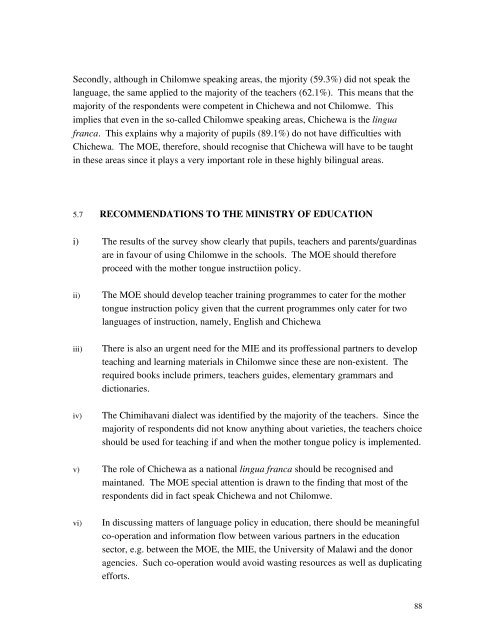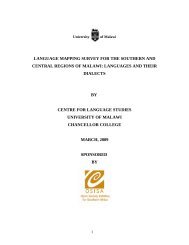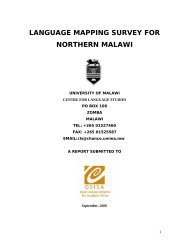SOCIOLOLINGUISTIC SURVEYS - Centre for Language Studies
SOCIOLOLINGUISTIC SURVEYS - Centre for Language Studies
SOCIOLOLINGUISTIC SURVEYS - Centre for Language Studies
You also want an ePaper? Increase the reach of your titles
YUMPU automatically turns print PDFs into web optimized ePapers that Google loves.
Secondly, although in Chilomwe speaking areas, the mjority (59.3%) did not speak the<br />
language, the same applied to the majority of the teachers (62.1%). This means that the<br />
majority of the respondents were competent in Chichewa and not Chilomwe. This<br />
implies that even in the socalled Chilomwe speaking areas, Chichewa is the lingua<br />
franca. This explains why a majority of pupils (89.1%) do not have difficulties with<br />
Chichewa. The MOE, there<strong>for</strong>e, should recognise that Chichewa will have to be taught<br />
in these areas since it plays a very important role in these highly bilingual areas.<br />
5.7 RECOMMENDATIONS TO THE MINISTRY OF EDUCATION<br />
i) The results of the survey show clearly that pupils, teachers and parents/guardinas<br />
are in favour of using Chilomwe in the schools. The MOE should there<strong>for</strong>e<br />
proceed with the mother tongue instructiion policy.<br />
ii)<br />
The MOE should develop teacher training programmes to cater <strong>for</strong> the mother<br />
tongue instruction policy given that the current programmes only cater <strong>for</strong> two<br />
languages of instruction, namely, English and Chichewa<br />
iii)<br />
There is also an urgent need <strong>for</strong> the MIE and its proffessional partners to develop<br />
teaching and learning materials in Chilomwe since these are nonexistent. The<br />
required books include primers, teachers guides, elementary grammars and<br />
dictionaries.<br />
iv)<br />
The Chimihavani dialect was identified by the majority of the teachers. Since the<br />
majority of respondents did not know anything about varieties, the teachers choice<br />
should be used <strong>for</strong> teaching if and when the mother tongue policy is implemented.<br />
v) The role of Chichewa as a national lingua franca should be recognised and<br />
maintaned. The MOE special attention is drawn to the finding that most of the<br />
respondents did in fact speak Chichewa and not Chilomwe.<br />
vi)<br />
In discussing matters of language policy in education, there should be meaningful<br />
cooperation and in<strong>for</strong>mation flow between various partners in the education<br />
sector, e.g. between the MOE, the MIE, the University of Malawi and the donor<br />
agencies. Such cooperation would avoid wasting resources as well as duplicating<br />
ef<strong>for</strong>ts.<br />
88





